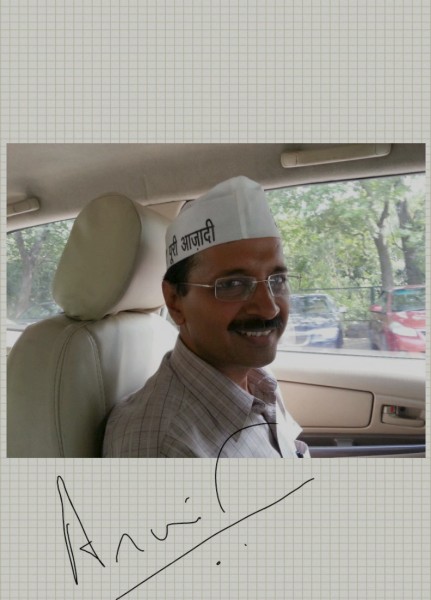
I sometimes wonder what I would be had I been born on 16 June 1968 in Sivani in Hissar. Would I too have gone on to complete my BTech from IIT, Kharagpur? Would I too have subsequently joined the IRS and then left it to get the Government of India get serious about the RTI or the Right to Information Act? I have no idea how my future might have unravelled itself. I do know, however, that Arvind Kejriwal has walked this path in chronology and become a name in every household today.
Well, yes, the political parties too talk about him in hushed and conspiratorial tones, but the aam aadmi certainly believes that this man just might convert some of the dreams that politicians have been showing, into the sort of reality that they have waited for generations now.
Arvind got the Ramon Magsaysay Award for “Emergent Leadership in 2006 for his contribution to the enactment of the Right to Information Act, 2005 and for activating India’s Right to Information Act movement at grassroots and social activities to empower the poorest citizens of India to fight corruption by holding the government answerable to the people.” After resigning from the IRS in 2006, Arvind founded an NGO (PCRF – Public Cause Research Foundation) by donating his Magsaysay award money as (charity) Corpus fund.
How many of us, who claim to be impressed by the way he takes on issues like corruption and Government inaction, know that he has also written a 175-page book called ‘Swaraj’. For those interested, the book is in Hindi and published by Harper Hindi (ISBN-13: 9788172237677 and ISBN-10: 8172237677). The book deals with the concepts of the swaraj movement and brings to them a modern and more contemporary reflection.
The day I met Arvind, he was busy with his agenda at Jantar Mantar… meeting those who suffer, exhorting people to seek redressal to their grievances through law. I heard him out at the Sikh Rally demanding action against Sajjan Kumar and he said loud and clear, ‘We cannot fight on an empty stomach. This government does not hear empty stomachs. This government listens to the whip of the courts. There is no point in dying in front of this government here near Jantar Mantar. It is important to take this battle to the courts.’ I knew I was standing in front of a man who was unafraid to get up and show any Goliath that he cannot be cowered into submission. I knew then that the interview would have some really aggressive insights into the man.
Aggressive insights however do not mean that Arvind is not a simple man… he is a short-statured person who practices vipassana. He listens. He uses words that are essential. He communicates from his heart that other hearts understand. These are no wild and whirling words… this is what emerged from the few questions that I was able to ask and those that he willingly answered in the short time available to us.
For the uninitiated, let me also add here that his political journey surely must have begun much before the AAP or the Aam Aadmi Party was formally announced on the 2nd of October 2012. The name was formalised on the 24th of November the same year. However, it will be unfair to say that politics was always subliminally present in this man… no, and he admits to it in the interview. He was truly involved with the RTI issue in 1997 until it was formally drafted… and then he continued to be a part of the RTI awareness program even in 2006.
Anna came to him or he came to Anna is not important… what is vital is that this meeting strengthened his resolve to clean the country of the menace of corruption. It was during this time that the idea of entering politics came to him and he talks about this in the interview. He knew then at one point that there was no turning back.
So Arvind is here with us. It is, I presume, up to the people now to accept him and not just that, to transform their own selves and help him in his fight against corruption.
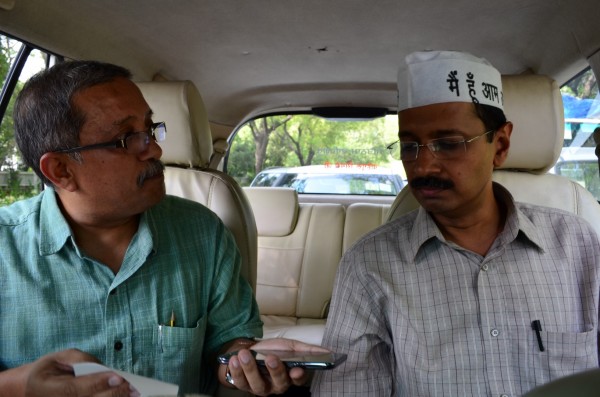
The Interview
Arvind Passey (AP): Sir, let me jump straight into the heart of politics first. ‘Corruption will not be an issue in the Delhi election,’ says Sheila Dixit. Why are other political parties reluctant to take up the issue of corruption head-on? What fears do they have?
Arvind Kejriwal (AK): This is because all political parties are corrupt. So obviously a corrupt person will never want corruption to become an issue in elections. But for people, corruption has become an issue of survival. Right from the smallest denominator in the socio-economic ladder, people are not getting rations… people are not getting education… people are not getting health facilities. This is because everything is siphoned off to the big scams that people keep hearing about every day. They are feeling cheated. In the last one year whatever Assembly elections have taken place, corruption was always an issue and corruption will remain an issue for politics till such time as corruption is rooted out.
AP: My only fear is that if there is only party intent upon talking about corruption or bringing up this issue, will the right buzz be created? This despite the fact that people are not happy with seeing the country seeped into corruption.
AK: The buzz is not… I repeat… the buzz is not created by any political party. The buzz is created by the people. The people are suffering and they always want corruption to become an issue. Till now the people didn’t have a choice. They now have a choice.
AP: How will you ensure that AAP or the Aam Aadmi Party will be able to create the right sort of buzz. Do you have the right sort of people to create the right sort of buzz?
AK: Buzz is already created… it is already there… people are already angry about corruption all around them. People are very angry about corruption and they are very agitated about it. The fact that lakhs of people came out on the streets when an old man like Anna Hazare sat on Anshan clearly shows that people are very agitated about corruption. People now want an opening…
AP: According to a newspaper, Bhakt Charan Das, a Congress spokesperson, has lashed out at journalists for taking up what’s not an aam aadmi subject. Do you have fears that your USP of aam aadmi will sooner or later be hijacked by these bigger political parties?
AK: Merely talking about an aam aadmi is not sufficient. Aam aadmi has to feel sympathetic and aligned to the people who are talking about them. If a corrupt person is talking about aam aadmi, obviously the aam aadmi will laugh at him. I repeat that a person has to be connected to aam aadmi to be eligible to talk about the aam aadmi. These current breed of politicians are just not connected to the aam aadmi.
AP: So is this the reason why Congress is shying away from talking about corruption?
AK: Congress is shying away from talking about corruption because the Congress is corrupt. All their leaders are corrupt. So they can’t talk of corruption.
AP: Let me shift the focus to the hero in your campaign… the aam aadmi. I have before me an email that your party sent to thousands. I too got one email and it clearly says: ‘Most of today’s problems are due to corrupt politics.’ Does the aam aadmi really understand that jumping a traffic signal makes him just as corrupt as Raja and his scam of crores? Do think the aam aadmi really understands the essentials of corruption?
AK: Two things are there. Corruption is bad and no one wants corruption to be in our midst. So a person jumping red light also needs to be criticised… and if A Raja siphons off one lakh seventy-six crores that also needs to be criticised. This is because an aam aadmi jumping a traffic light does not give licence to A Raja to indulge in corruption. One person’s corruption does not justify another person’s corruption. Both sorts are bad. But it is also a question of culture and ethos. There has been no deterrence in our society against breaking of the laws. For instance, if you jump a traffic light in the US, there is certainty and swiftness of punishment. You are certain to be punished and the punishment will come upon you immediately. However, in India you know you can get away with murder so it is laxity of law that encourages a culture of corruption. So if the government starts enforcing law very strictly and firmly, I’m sure people will stop breaking the law.
AP: So you believe that people are mature enough to handle power when it comes to them. I say this because you email to the aam aadmi mentions restoring power back to the people. Don’t you think this is a recipe for anarchy? I mean the fact that you intend to hand over power to the people.
AK: Who are you to hand over power to the people? The people are sovereign in a democracy… people are supreme… no one can hand over power to the people. People can snatch away the power from these people (read politicians). It is we the people of India who drafted this constitution… it is we the people of India who built this parliament… it is we the people of India who gave power to these politicians… who are they to give that power back to us? Are you getting my point? So it is people who are sovereign in a democracy. So the people are indeed powerful… so when you ask if people can handle power, the answer is… obviously, the people will exercise this power the way they want to. This means that complete political power lies with the people. Can the people handle it? Well, initially the people might make mistakes but slowly and gradually they will learn from their mistakes and they will get more mature. Therefore, the power that has been taken away from the people needs to be restored to them… they should be allowed to make mistakes. Today the mistakes are being made by the politician and people are suffering because of that.
AP: Power, politics, and finance go together. Do you think only donations from the common man will be enough for the survival of your party?
AK: Yes, because that is the cleanest money that you can imagine. We want to remain clean in politics, so our finances too have to be very clean. I’m sure that just as Barack Obama raised clean money… and this clean money came from ordinary people, the masses… he raised his finances by 3, 5, 10, and 100 dollar contributions from them. I am sure we will also be able to raise sufficient money for running our election campaign and this entire backing will come from the aam aadmi.
AP: What are your other sources of funding for your brand of transparent politics?
AK: Common people. What other sources can there be? There can be no other sources of funding. We will not… err… we will not have any kind of quid pro quo with anyone. This means if there is someone or some company giving me one crore today, there will be some underhand deal of some favour from us. There will be no such thing because our entire list of donors is transparent and every detail in on our website. There will be no undue favours given to anyone.
AP: Ok. Let’s get away from politics, corruption, and finances for now. The internet and the social media are a reality today. No, my question is NOT about the role of social media in politics today. That role is clearly defined by the sort of response it gets. I want to ask you why the conventional politician is so afraid of the social media and the internet as a whole?
AK: Social media is about accountability and if you are there you are also criticised. It’s not that people will always praise you… you are criticised and you need to answer to their criticism. The conventional politician does not want to answer because there are too many skeletons in their cupboard. Only if you clean… only if you’re upfront… can you dare to be there. Social media is like being with the people always… right in their midst… and facebook and twitter demand you to be straight and straight-forward. Otherwise people will jump at you, pounce at you…
AP: Is this why the municipal corporations of Delhi have walked out of Facebook?
AK: I really don’t know about this. Maybe they couldn’t handle the criticism.
AP: So handling criticism is important. How will you ensure that your members, if elected, will be able to handle all the criticism that the social media generates? Will the AAP members also pull out of the social media, if elected?
AK: I think this is an important factor and we will have to put in place all the systems within our party and that they should face the public at regular intervals. We will ensure our presence on the social media.
AP: All around us we find a fascination with branding. Branding is now no longer an exclusive domain of consumer products. Bharat Nirman is how the Congress is using this concept… they sell dreams. Do you think an anti-corruption stance is stronger and sturdier than selling dreams?
AK: What is important is honesty. If you are branding something which is dishonest, people will finally see through it. It will not last. But if you’re propagating a thought, even advertising… and telling the truth, then the people will buy that. Lies don’t last. Bharat Nirman is about telling lies… and just like the India Shining campaign, this too will be a flop. India Shining was a lie. Bharat Nirman is also a lie.
AP: So India Shining was a lie and Bharat Nirman is also a lie. Does this imply that AAP will not be aligning with either of the two major political behemoths?
AK: We will not be affiliated to them.
AP: There was a recent article I read in one of the papers that had ‘Happy teacher will change the world’ as its headline. Politicians also love to change the world… so are they more like teachers?
AK: Politicians are teachers… they are good teachers… everyone is a teacher and everyone is a student in life. Everyone is learning and teaching by his own conduct. So yes, you can say that politicians are like teachers because a lot of people watch them, observe what they do… and ultimately get influenced by them.
AP: Why has AAP appeared only in 2012? You’ve been on the scene for ages now. Why 2012? Is it because such things happen when the masses are ready to accept them? Almost like what Confucius said: When the student is ready, the teacher shall appear! So are the people now ready for a real teacher to lead them?
AK: I think you’re right. Every moment has its specific time of appearance. So maybe this is the right time for AAP. I cannot comment yet on how the masses will respond to the appearance of AAP… but the time for AAP is certainly NOW. However, we cannot yet say anything about the future of AAP.
AP: I know I don’t have all the time in the world to ask you all the questions that need an answer from you. So let me jump straight into another issue that any reader would love read about. Reservations. What is your opinion on reservation? Isn’t it time for India to stop talking of reservation?
AK: You can’t brush away the fact that there are some sections of society who have suffered injustice and untouchability for ages now. It is not that untouchability is over… it still exists in villages of Uttar Pradesh… well, in most of the states. I’ve been to villages and you still have tolas in the villages of UP and Bihar where people still suffer the humiliation that you may read in newspaper stories. So in order to bring them into the mainstream, it is important to have reservation. But at the same time, there are a few steps to be taken.
Firstly, those people who have got the benefit of reservation once, or a person who has now become economically well-off, should not be given any sort of reservation. This is because the benefit needs to go to many others rather than the sons and daughters of people who have already availed this benefit.
Secondly, just reservation will not solve the problem. There more than 15 crore people coming under the scheduled caste category and there are, on an average, two lakh government jobs all across the country, including State and Central job pools. So even if we use this tool of two lakh jobs generated every year, by when will we finally solve the issue for the 15 crore plus people who need this attention? It is mind-boggling.
There is only one real tool that can help bringing these under-privileged sections of the society in the mainstream… and that is not reservation but education.
If we improve the quality of education in government schools and bring it at par with the best private schools, I think in one generation we will be able to bring all these under-privileged sections of society at par with other sections. Then these people will themselves stand up and say that they do not want any reservation and they want to compete with others on an equal footing.
AP: All great sounding words and ideas. But the effort to achieve this stage has been going on for decades now…
AK: No, no effort has been going on… reservation has become politics today. It is only politics that is played with the issue of reservation. Reservation is only being used for nourishing vote-banks. If all these political parties are actually interested in bringing these sections at par with the rest of the society, why don’t they improve education? There is absolutely no improvement in education. They are only talking of reservation of SC/ST or reservation of OBCs or reservation Muslims or reservation of this and reservation of that… what I’m trying to say is that till such time as all these societies come in the mainstream through education, till such time reservation is required. This is what the dream of the founding fathers was… they too thought that in ten years we will be able to bring the underprivileged into the mainstream… and so reservation was meant only for ten years! But subsequently they kept on amending the constitution because good education was never provided to the entire country.
AP: What do you think of the current education policies that include passing and letting every student get up to secondary level?
AK: I don’t think it is such a brilliant idea.
AP: You were also in college once. Could you have even imagined that you’d be such a politically charged atmosphere some day?
AK: No… I was never interested in politics.
AP: So what was the catalyst that pulled you into politics?
AK: You know I got into politics slowly. I first got into the Right to Information issue and debate… then I got involved with the Jan Lokpal movement with Anna Hazare. It was then I saw how all these political parties cheated the people and their demands and I had no option but to enter politics.
AP: So political involvement during your college years was not the reason for entering politics. Do our colleges and all the political hullaballoo there actually prepare students to understand the truth about politics?
AK: No, they don’t and there is a serious problem with our colleges. They neither prepare a good citizen nor do they transform a student into a good human being. Political parties are playing politics with education. Distributing laptops, for instance, is nothing but playing politics with education.
AP: Coming back to the mainstream of politics. What will be your criteria for selecting the right AAP candidate in the constituencies?
AK: The criteria are clearly mentioned on our website. However, we are looking for candidates who are honest, who have done extensive social work for the society, and who are sensitive to the needs of the aam aadmi… and also who have some understanding of people’s problems and their solutions.
AP: Will Anna Hazare back you in your endeavours?
AK: I don’t know. It is for him to decide if he will support me or not. I don’t have an answer to that.
AP: The Education Post is a weekly paper that is read by thousands of students all over the country. What message do you have for them?
Arvind Kejriwal: All students who are based in Delhi… if you’re still not a voter go and register yourself. This is because in November, Delhi goes to the polls. This time you have a choice because earlier we were stuck with BJP and Congress. This time I expect not just your vote for the AAP, but I expect that you go out in your area, in your class, in your college… and campaign for the Aam Aadmi Party. This is the last chance to improve the country. At least in my lifetime I don’t see any more opportunities coming.
AP: Thank you for letting your thoughts get woven in an interview that will be read by a lot of students.
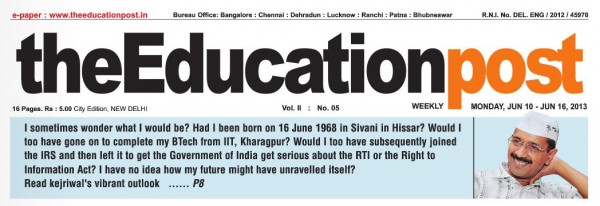
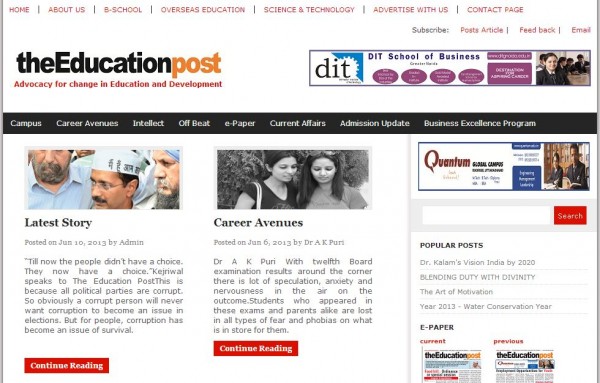
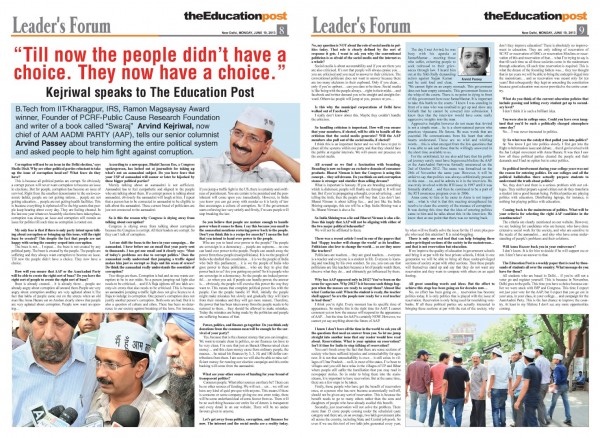
Arvind Passey
Published in ‘The Education Post’ dated 10 June 2013
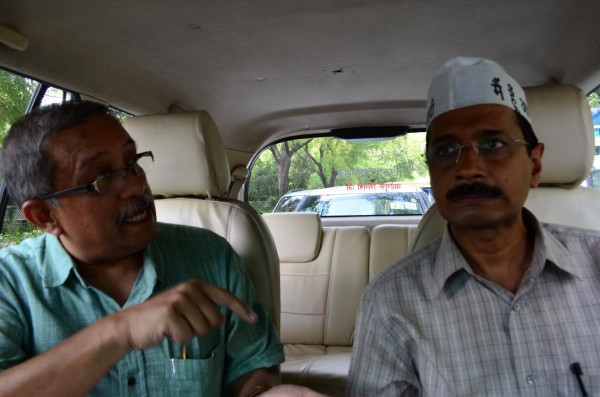
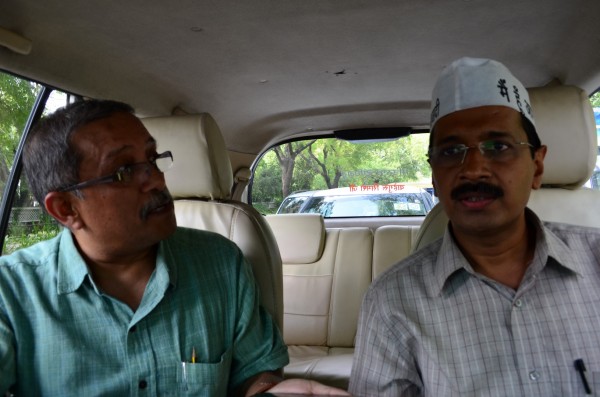
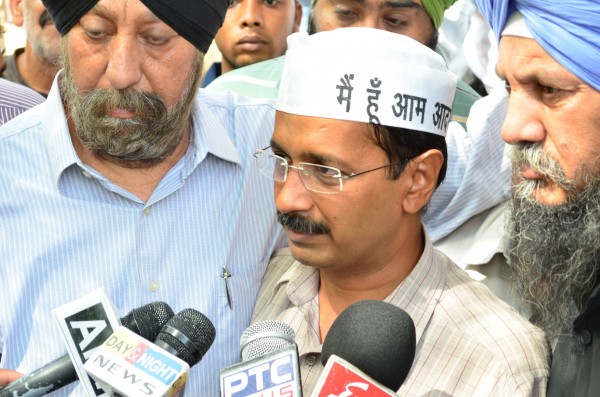









30 comments
Aditya Pranav says:
Jun 10, 2013
I really liked reading this interview. I have heard and read him emphasizing on the things mentioned above so many times and yet it does become inspiring each time you have something to hear from him. People in India genuinely have a choice now. With the old political biggies like Congress and BJP being on the back-foot already because of corruption/misgovernance and internal feud respectively; it’s high time the people of this country recognized the opportunity that has presented itself. We simply cannot afford to complain of noise when the opportunity knocks. The political revolution has begun and it’ll lead to the cleansing of the rot in the current system. All of us need to do our own bit towards this.
Thank Mr. Passey for reaching out and conducting this interview. I also like the introduction you wrote before the interview. Bravo! I am sure it’s going to be enlightening for the students who get to read it.
Arvind Passey says:
Jun 10, 2013
Thank you for having read and found the article revealing… that is indeed the purpose. It is time that each of us got wiser… got thinking… and got bolder. It is time to wake up and follow a path that may rid us all of corruption that is so rampant in our country.
Do share the post with all your friends… and ask them to share as well…
sunil says:
Jun 10, 2013
good article
Arvind Passey says:
Jun 12, 2013
Thank you, Sunil… there will be more on issues that concern all of us. Hope you read them all.
poonam says:
Jun 11, 2013
I am already up for Kejriwal.. we do hv a choice now.. He is RTI activist who is concerned and committed for the betterment of aam admi.. the media is ignoring him for the reasons best known.. but a buzz needs to be created..
Arvind Passey says:
Jun 12, 2013
I don’t think Arvind Kejriwal is being ignored by anyone… including the media. It is just that in today’s world of news-worthiness, every piece of news has to really fight it out before reaching a stage where it gets disseminated as news! 🙂
Rickie says:
Jun 11, 2013
Congratulations on the scoop, and for this well rounded, in depth interview. I am still critical of Arvind Kejriwal’s tactics, but by God, if this man can achieve even 50% of what he has set out to do, we are in for better times.
Arvind Passey says:
Jun 12, 2013
It is always good to remain critical of everyone and everything… complacency is the surest way to extinction! Even Arvind Kejriwal needs to prove a lot before he and his plans and actions get a really fixed place in people’s attention.
enoch says:
Jun 16, 2013
Wat abt spreading aam aadmi across the nation… ?
Arvind Passey says:
Jun 17, 2013
Aam Aadmi is already an intrinsic part of the nation… we are all aam aadmi… and it is time that we decided to wake up.
Rachna says:
Jun 19, 2013
I actually see hope in what the man says and envisages. And that is a really thorough interview. I am keen to see how much he can do and his methods when he actually gets a chance at it.
Arvind Passey says:
Jun 20, 2013
I have a feeling that even Arvind Kejriwal is confident of every word he has spoken… though even he would be rather keen to see how much of his confidence gets translated into real-time advantage for the nation.
Richa Singh says:
Jun 21, 2013
What strikes me as wonderfully refreshing is that he speaks so seamelssly about the issues and makes you believe it is only a word away. Rise and speak up. Honestly arvind kejriwal may take a long time to settle down in politics but the voters can surely take a thing or two our of his life for a better india tomorrow.
Thanks arvind for bringing the man we all have made a household name up close for us 🙂
Arvind Passey says:
Jun 22, 2013
Nice to know that you feel so strongly about this man with a vision… I wish he succeeds!
aamjunta says:
Jun 23, 2013
I like the interview in general and your post. One request to Mr. Kejriwal – Delhi is not only India, we need to go to other parts also. Else, one big opportunity will be lost. Who know what happens in 5 years… long period.
Arvind Passey says:
Jun 23, 2013
Nice to know that you liked the post… yes, we all hope Arvind Kejriwal has a pan-India presence! But, more important, is for his crusade against corruption and his thoughts to get country-wide attention… and still more important is that people change and become better!
Sridevi says:
Jul 2, 2013
I like the whole focus of the interview. Very apt. Though I am not politically inclined but this post was something I held onto. Thanks for sharing
Arvind Passey says:
Jul 2, 2013
Even I loved the time I spent with Arvind Kejriwal… a very down-to-earth and straight-forward man whose concepts were absolutely clear. He knew what he wanted say and why. No ambiguity anywhere. No attempt to dodge questions. No wish to bulldoze through any uncomfortable zone.
Sridevi says:
Jul 3, 2013
Oh! then I hope whatever he wants to accomplish for us comes true.
Arvind Passey says:
Jul 3, 2013
🙂 A lot depends on us all… we need to change and then someone, anyone can catalyse the change!
Sridevi says:
Jul 4, 2013
Very True 🙂
Pawan Bahuguna says:
Jul 11, 2013
Very very amazing interview Arvind, I really enjoyed reading every word of it.
Arvind Passey says:
Jul 12, 2013
Thank you… do share the post link with your friends too. 🙂
Mayura Rao says:
Aug 12, 2013
A very detailed interview indeed, good job Mr.Arvind but with attempts being made to dilute RTI itself I wonder if we could really rejoice at an alternate option? should RTI activists/reformers gain media attention and then fight corruption else they get killed silently? We certainly need more and more Arvind kejriwals’ like people.
Arvind Passey says:
Aug 12, 2013
Yes, even I am watching what happens to the RTI Act… hope our politicians don’t maul it out of shape.
Pritam Thakur says:
Aug 15, 2013
Great Interview Sir… I have huge respect for this man. It is indeed a difficult choice to give all the pleasures he could have enjoyed and fight for justice !
Arvind Passey says:
Aug 19, 2013
Thank you, Pritam… do read the other posts too. You’ll find them all interesting. 🙂
ashwinia says:
Dec 24, 2013
I like it when people don’t equivocate by using politically right and diplomatic words which make no real sense. And this interview is far from that. There’s clarity, there are real answers. Thanks for the interview Sir. I really hope promises are kept. I’m glad India’s seeing quite a revolution at this point.
Arvind Passey says:
Dec 25, 2013
Nice that you liked the way the interview went about. I do hope Arvind Kejriwal succeeds in helping us all root out corruption from India.
Standing with people, not above them | Passey.info says:
Nov 15, 2015
[…] this is not the way I want to remove poverty. It is only about giving some joy to a child.’ That interview is there on my blog and you can click and read it whenever you are inclined to. I am simply trying to go beyond the […]